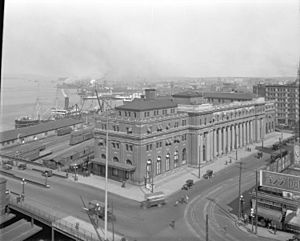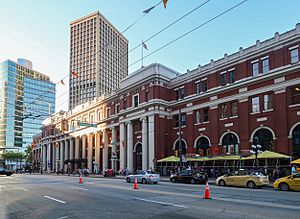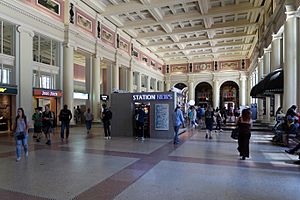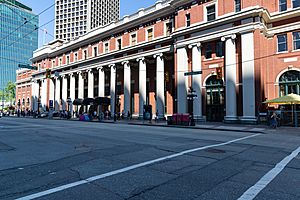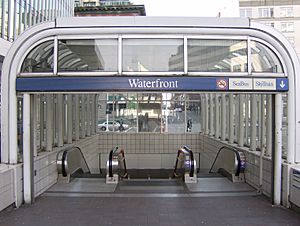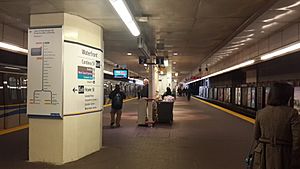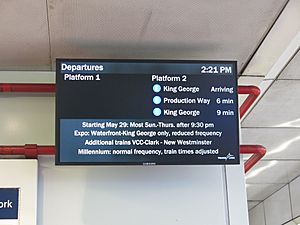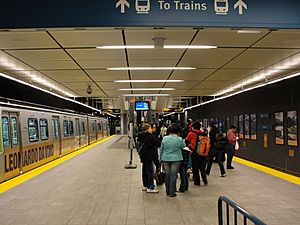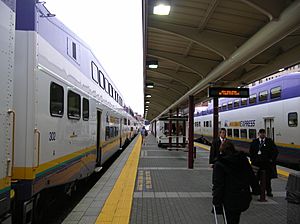Waterfront station (Vancouver) facts for kids
Quick facts for kids
Waterfront
|
|||||||||||||||||||||||
|---|---|---|---|---|---|---|---|---|---|---|---|---|---|---|---|---|---|---|---|---|---|---|---|
| TransLink station | |||||||||||||||||||||||
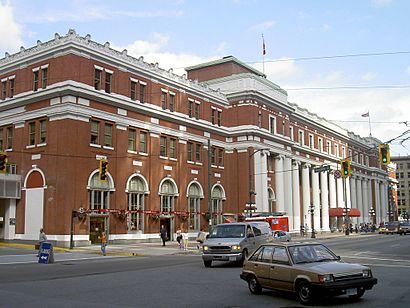 |
|||||||||||||||||||||||
| Location | 601 West Cordova Street, Vancouver 439 Granville Street, Vancouver |
||||||||||||||||||||||
| Coordinates | 49°17′09″N 123°06′42″W / 49.28583°N 123.11167°W | ||||||||||||||||||||||
| Owned by | Canadian Pacific Railway TransLink |
||||||||||||||||||||||
| Platforms | 3 separate sets of centre platforms | ||||||||||||||||||||||
| Tracks | 6 | ||||||||||||||||||||||
| Connections | R5 Hastings St | ||||||||||||||||||||||
| Construction | |||||||||||||||||||||||
| Structure type | At-grade and underground | ||||||||||||||||||||||
| Bicycle facilities | Outside bike racks | ||||||||||||||||||||||
| Disabled access | Yes | ||||||||||||||||||||||
| Architect | Barott, Blackader and Webster | ||||||||||||||||||||||
| Other information | |||||||||||||||||||||||
| Station code | WF | ||||||||||||||||||||||
| Fare zone | 1 | ||||||||||||||||||||||
| History | |||||||||||||||||||||||
| Opened | August 1, 1914 | ||||||||||||||||||||||
| Key dates | |||||||||||||||||||||||
| 1977 | SeaBus opens | ||||||||||||||||||||||
| 2009 | SkyTrain: Expo Line opens | ||||||||||||||||||||||
| 1995 | West Coast Express opens | ||||||||||||||||||||||
| Traffic | |||||||||||||||||||||||
| Passengers (2019 ) |
|
||||||||||||||||||||||
| Rank |
|
||||||||||||||||||||||
| Services | |||||||||||||||||||||||
|
|||||||||||||||||||||||
|
|||||||||||||||||||||||
Waterfront Station is a very important place for public transportation in Vancouver, British Columbia, Canada. It's like a big hub where you can switch between different types of transit. You can find it on West Cordova Street in Downtown Vancouver.
This station is super handy because it's close to many cool spots. You can easily walk to places like the historic Gastown area, Canada Place, and the Vancouver Convention Centre. There are also float plane and helicopter terminals nearby if you want to fly!
Contents
A Look Back: Waterfront Station's History
Waterfront Station first opened its doors on August 1, 1914. It was built by the Canadian Pacific Railway (CPR). Back then, it was the final stop for long train journeys across Canada. Trains came all the way from places like Montreal, Quebec and Toronto, Ontario.
This building is actually the third train station the CPR built here. The earlier stations were a bit different. This one has a classic, grand style.
In 1978, another company called Via Rail took over passenger trains. For a short time, they used Waterfront Station. But in 1979, Via Rail moved all its Vancouver trains to a different station. The last passenger train left Waterfront Station on October 27, 1979.
Waterfront Station Becomes a Transit Hub
Waterfront Station started changing into the busy transit hub we know today in 1977. That's when the SeaBus began operating. The SeaBus is a ferry that takes people across the water. It has its own special dock connected to the main station.
In the early 1980s, some of the old train tracks were removed. This made space for the SkyTrain's Expo Line. The Expo Line opened on December 11, 1985. During Expo 86, a big world fair, SkyTrain ran special shuttle trains from Waterfront. These trains connected Canada Place to the main Expo site.
In 1995, new platforms were built for the West Coast Express. This is a commuter train that uses the same tracks as the old CPR trains. These new platforms were put in the exact spot where the original CPR platforms used to be.
New SkyTrain Lines and Upgrades
In 2002, the Millennium Line SkyTrain also started using the tracks at Waterfront. They shared tracks with the Expo Line for many years. Later, in 2016, the Millennium Line service changed.
A brand new SkyTrain line, the Canada Line, opened in 2009. It has its own separate platforms at Waterfront Station. You can easily get to them from the main building. Waterfront Station is now the end point for both the Expo Line and the Canada Line.
In 2010, during the Vancouver Olympics, Waterfront Station got new "T" signs. These signs helped visitors easily find transit stations.
More recently, in 2018, TransLink announced upgrades for the Canada Line platforms. These upgrades included adding more escalators. Construction started in 2019 and finished by the end of that year. In 2020, work also began to replace the escalators for the Expo Line. This meant some entrances were closed for a short time.
Waterfront Station's Amazing Look
The main building of Waterfront Station has a classic, elegant design. It's built with red bricks and has a row of smooth, white columns. These columns are called "Ionic order" columns. You'll see them inside the grand main hall too.
Inside the main hall, there are two big clocks high up on the walls. Look closely, and you'll also see beautiful paintings. These paintings show different scenic places in Canada. They were painted in 1916 by an artist named Adelaide Langford. A company from Montreal designed this impressive building.
What Services Can You Find Here?
Waterfront Station is a busy place with many ways to travel:
- SkyTrain Expo Line: This line takes you through Vancouver to places like Burnaby, New Westminster, and Surrey.
- SkyTrain Canada Line: This line goes through Vancouver to central Richmond and even to Vancouver International Airport.
- West Coast Express: This is a commuter train that connects Vancouver to towns like Port Moody, Coquitlam, and Mission.
- SeaBus: This passenger ferry takes you across the water to Lonsdale Quay in North Vancouver.
- TransLink Buses: Many local and express buses stop near the station.
- HeliJet: There's a heliport right next to the SeaBus area. You can easily connect to the main station building from there.
- Vancouver Harbour Flight Centre: This is a terminal for float planes. It's just a short walk from the station.
Getting Around the Station
Station Entrances
Waterfront Station has a few entrances to help you get where you need to go:
- Cordova Street Entrance: This is the main entrance to the station building. It connects to all the different types of transit. It's also fully accessible for everyone.
- Howe Street Entrance: This entrance is handy for getting to Canada Place. It also has an underground path to Sinclair Centre and Waterfront Centre.
- Granville Street Entrance: This entrance opened in 2009 when the Canada Line started. It's located at the south end of the Canada Line platforms.
Bus Connections Nearby
You can catch many buses close to Waterfront Station. Here are some of the main bus stops:
- West Cordova Street: Buses like the 44 UBC and 50 False Creek South stop right in front of the station.
- Cordova Street and Seymour Street: You'll find buses such as the 3 Main, 4 Powell, and 7 Nanaimo Station here.
- Hastings Street: The R5 Hastings St bus stops north of the Granville Street entrance.
- Pender Street: Buses like the 4 UBC, 5 Robson, and 10 Granville stop south of the Granville Street entrance.
- Granville Street: More buses, including the 14 UBC/Hastings and 17 Oak, are available on Granville Street.
 | Kyle Baker |
 | Joseph Yoakum |
 | Laura Wheeler Waring |
 | Henry Ossawa Tanner |


